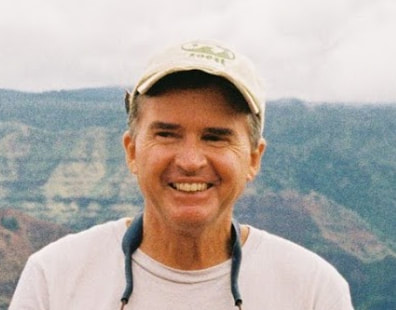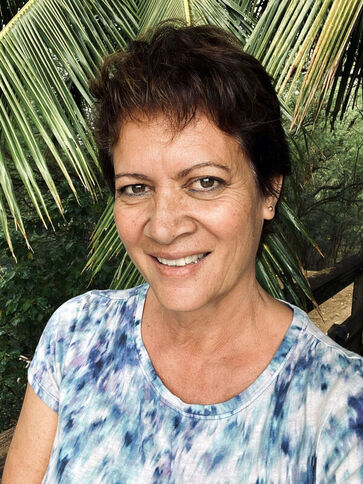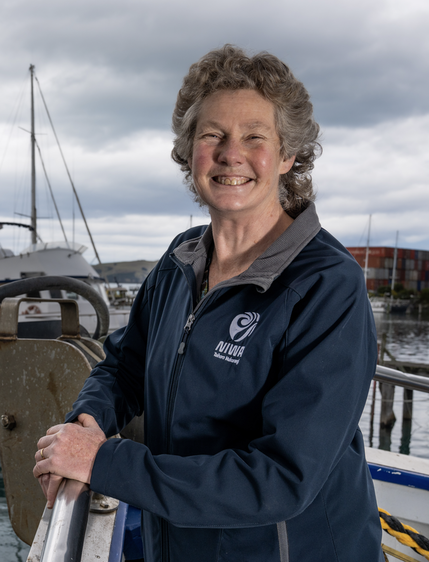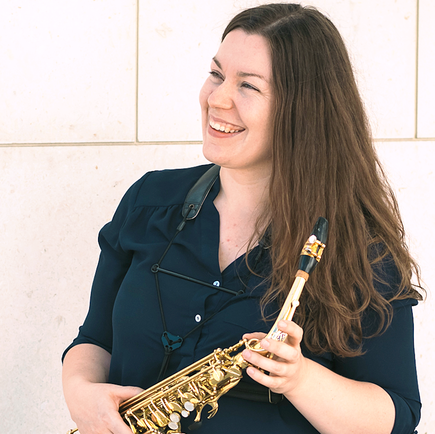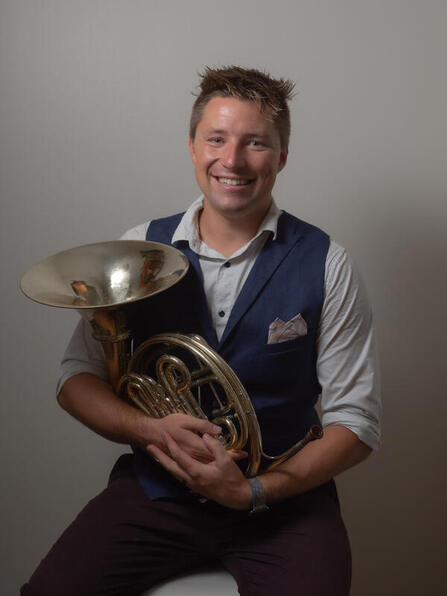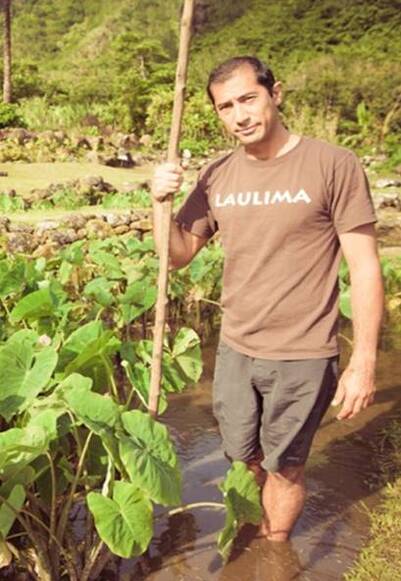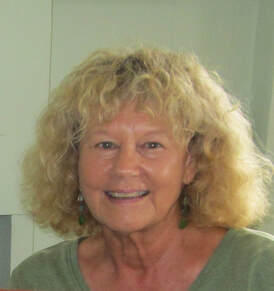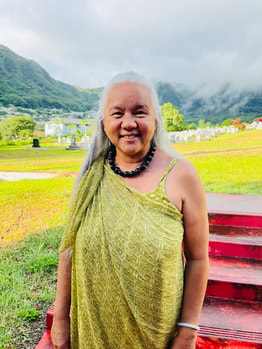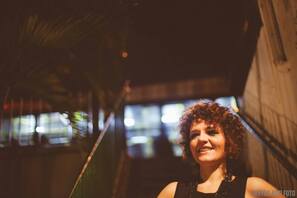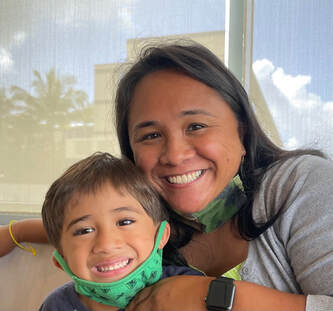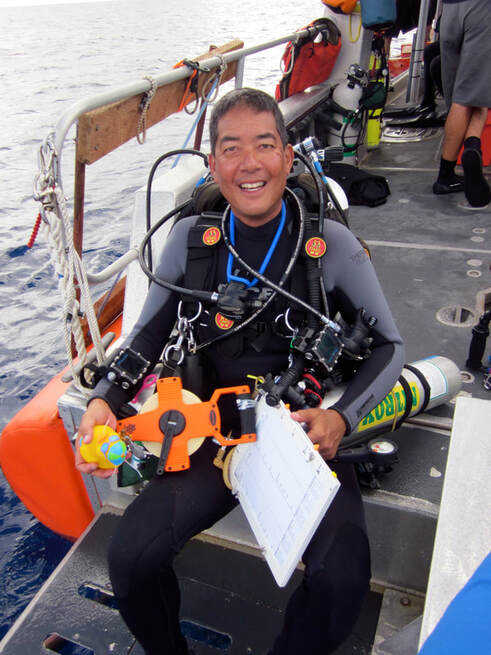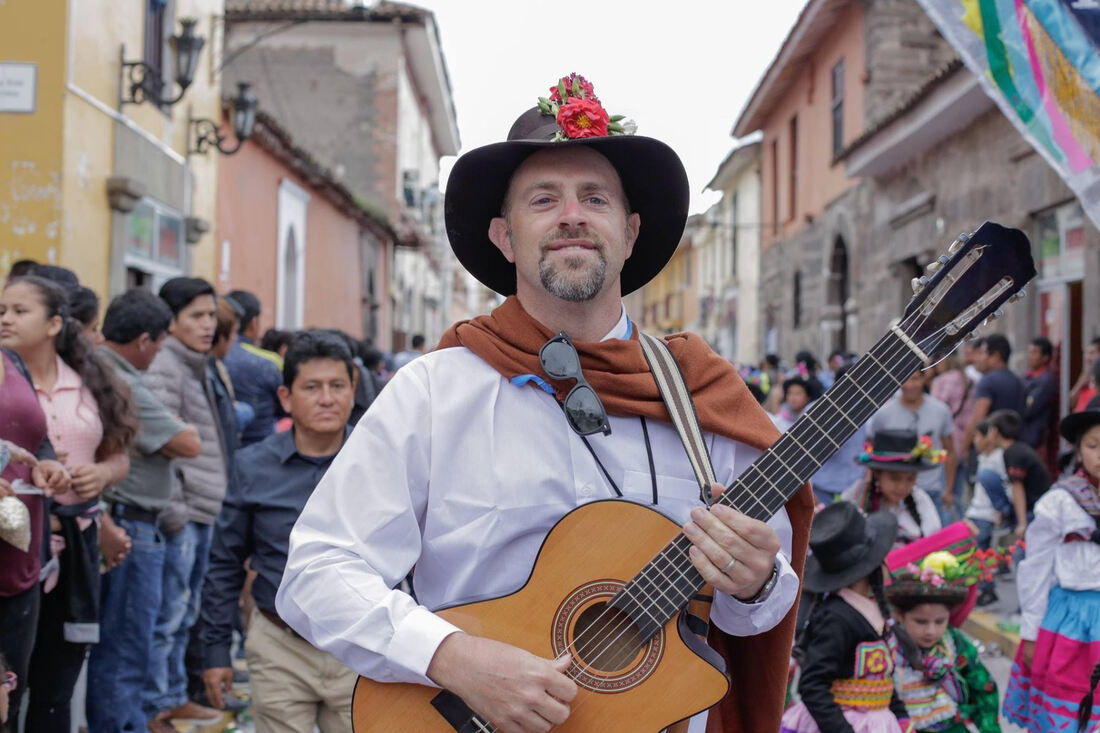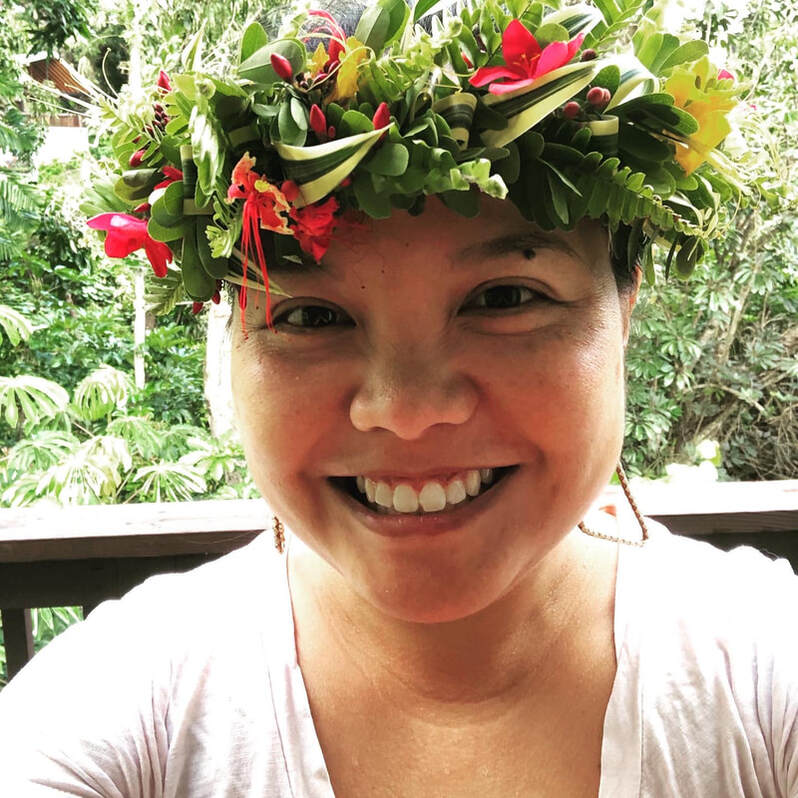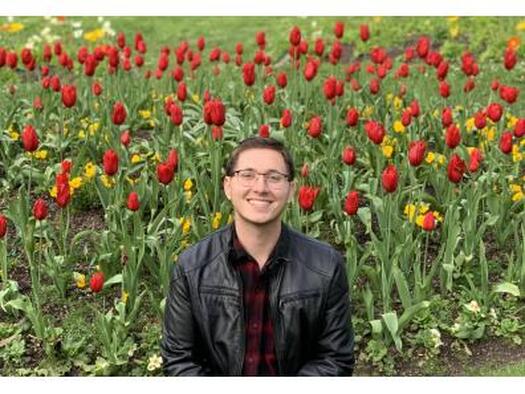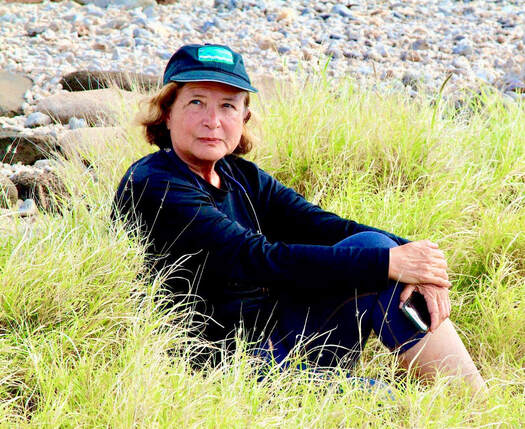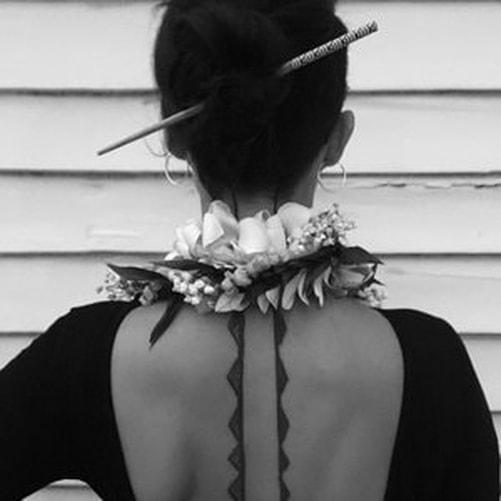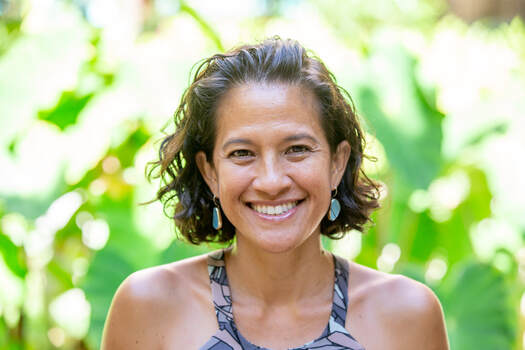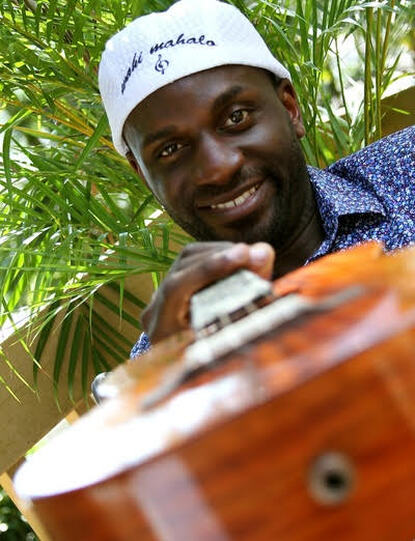jan 31 place-based education and sustainability
In a modern urban society we can become disconnected from our environment and may develop a disregard for sustainable practices. By making concerted efforts to learn about the origin stories of different cultures and participate in activities that utilize locally-sourced raw materials we can reestablish and strengthen a sense of connection to the environment and a desire for responsible environmental stewardship.
Speakers and Performers
|
Speaker: Dr. Scott Rowland
Scott Rowland is the product of Hawai‘i public schools, UH Mānoa, and Oregon State University. He has been studying and teaching about Hawaiian volcanoes for >30 years, particularly trying to understand how lava flows are emplaced and how they hold information about the eruptions that supply them. He also studies the morphology of volcanoes and spends a few hours a week working with the Curiosity rover on Mars. The presentation this evening was inspired by friendships and work with Eric Enos and Lorin Gill, two giants in the world of Hawaiian cultural knowledge and natural history. The topic is from a UH class called "Volcanoes in the Sea" that looks at how Pacific geology and geophysics have had an effect on the people who live here, both in the past and in the present. |
|
Performer: Dalani Tanahy
The art of Hawaiian kapa or bark cloth making had been dormant for about sixty years and had recently entered a revival period when Dalani Tanahy began to learn, then embrace, then be captured by the many elements and moods of kapa. An artist since childhood, she delighted in the creative process in all its forms. The road to being a kapa maker was a long and arduous one and Dalani was mostly self-taught as both a practitioner and hands-on instructor of the many arts involved in the making of kapa. Part of her longevity in this art was directly because she enjoyed and was challenged by the many disciplines required in it, including horticulture, the natures of wood and stone for tool-making, the science of natural dyes and fermentation and above all, the patience to fashion the inner layer of tree bark into a soft pliable material. Teaching it for almost 25 years helps to ensure that she can always look at kapa with fresh eyes as she tries to view and create the art as influenced by ancestral sensibilities |
feb 7 intercultural collaboration
The process of sharing and exchanging knowledge, practices, and information between cultures opens our eyes to different points of view and allows us to incorporate elements of different cultures into our own daily lives. This process also brings about new ideas and perspectives making us more creative, more tolerant of other cultures, and helps us connect with others in deeper, meaningful ways.
Speakers and Performers
|
Speaker: Dr. Kim Currie
The oceans take up some of the carbon dioxide produced by fossil fuel burning, this is making the seawater more acidic and has consequences for shellfish and other marine life. Kim Currie is a marine scientist working for NIWA, who studies ocean acidification in the waters around New Zealand. Kim is also involved in several international initiatives to help scientists, particularly in Pacific Island nations, to set up ocean acidification programmes in their own countries, and to integrate the science into a local community context. The philosophy of combining different knowledge types, from indigenous, local and scientific perspectives is important and a challenge that Kim is embracing. The ethical use of environmental data is also something to be considered, along with the more usual FAIR (findable, accessible, interoperable and reusable) data model. Performer: Dr. Jennifer Blackwell
Dr. Blackwell is a music educator, music researcher, and saxophonist, currently serving as Assistant Professor of Music at the University of Hawaiʻi at Mānoa. Her research interests include applied music teaching expertise (from behavioral, cognitive, social, cultural, and affective perspectives), music performance expertise, applications of authentic context learning paradigms, popular music pedagogy, and teacher training. Jennifer has worked as a woodwind studio teacher and ensemble director in a variety of settings including middle school, high school, community ensembles, and universities across the United States and Canada. As an active performer and advocate for new music, Dr. Blackwell has commissioned or premiered over 35 new works for saxophone, frequently collaborating with emerging and established composers. Performer: Brian KM
Brian KM has had a rich career as a solo, chamber, and orchestral musician as principal horn for ensembles around the country. He spent four years as the principal horn for the United States Pacific Fleet Band and served as the hornist for the group's premiere brass quintet, The Harbor Brass. He performed with various new music ensembles during his collegiate training at Shenandoah Conservatory and The University of Maryland, College Park. He has commissioned multiple new works for solo horn and various chamber groups and has played in the world premiere of many pieces for orchestra and band. Brian KM has enjoyed serving as a resident artist for Universities, guiding new composers in their writings for horn and chamber groups. Brian KM's solo horn and electronics work is the product of a feverish dive into the world of electronic music. Since he started writing, Brian KM has placed his original compositions for the medium into over 60 venues, including schools and Universities in Hawaiʻi, the mainland United States, and Canada, delighting and intriguing hundreds of audience members. He was recently a featured soloist at the 53rd International Horn Society Conference and at FRINGE Oʻahu. For more information, please visit briankm.com. |
feb 14 Continuation of pacific tradition
With countless cultures and languages at risk of being lost it is vital the knowledge and practices of cultures be known and preserved. Continuation of cultural traditions, such as those here in the Pacific perpetuate cultures in the modern era and serve as a place of strength for younger generations to connect with their history. Further, creation stories, legends, and different cultural practices can offer insights into various natural processes and historical events.
Speakers and Performers
Speakers and Performers
|
Performer: Kumu Walis
Kumu Walis is Taiwanese indigenous, belongs to Seediq Tgdaya and Atayal Plngawan communities. She travels to Hawaii, Japan and Tahiti to learn Ori Tahiti (Tahitian dance), and in 2009 she founded her Ori Tahiti dance school in Taiwan - Te Natira’a, which means bridge in Tahitian language. She wishes to build the platform between Taiwan and Tahiti, because she deeply falls in love with both cultures, and wants to help two cultures to grow by exchanging their knowledge and arts to each other. Speaker: Dr. Kawika Winter
Dr. Kawika Winter is a biocultural ecologist who has focused his career on decolonizing science and conservation from multiple angles. In that regard, he wears various hats in the spheres of research, policy, and resource management. Dr. Winter is currently the Director of the He`eia National Estuarine Research Reserve on O`ahu with a tenure track position at the Hawai`i Institute of Marine Biology, and a graduate faculty position in Natural Resources and Environmental Management, as well as an Affiliate Researcher position with the National Tropical Botanical Garden. Prior to that, he was the Director of Limahuli Garden and Preserve on Kaua`i, where he led landscape-scale biocultural restoration efforts for more than a decade. He also holds seats on the State's Endangered Species Recovery Committee, NOAA's Hawaiian Humpback Whale Sanctuary Advisory Council, and the Hawai`i Conservation Alliance's Steering Committee. Notably, Dr. Winter is one of the few people who has obtained all three higher-education degrees from the University of Hawaiʻi at Mānoa in a life science. He credits his current effectiveness to his choice of staying in Hawai`i for the entire course of education -- from pre-school to PhD -- and is a strong advocate for the notion that UH can provide the best pathway for many local students in their pursuit of degrees in higher education. His career stands as a testament to what "keiki o ka ʻāina" (children of the land) can accomplish if they choose to walk that path. |
feb 28 Storytelling, Ideology, & Indigenous Images
For many Indigenous cultures oral traditions and storytelling are integral to the transmission of knowledge. This process perpetuates origin stories, values, beliefs, and historical events. Oral traditions also assist with reconnecting descendants to their past and help them find strength in restoring familial legacies.
Speakers and Performers
|
Speaker: Valerie Monson
Valerie Monson is a founding member of Ka Ohana O Kalaupapa and currently serving as the organization’s Coordinator. She began visiting Kalaupapa in 1989 as a reporter for The Maui News and has been interviewing the Kalaupapa residents and family members ever since. She is a member of the ‘Ohana Board of Directors and the Kalaupapa Memorial Committee. Speaker: Kehaulani Lum
Kehaulani Lum first visited Kalaupapa in the 1980s when she led a U.S. House Appropriations Committee fact-finding mission. More than 40 years earlier, her grand-uncle, Henry Kalalahilimoku Nalaielua, and his sisters, Evelyn and Christina, and his uncle Joe were sent to the Settlement as children, and remained there for their entire lives. Kehaulani is a member of the ‘Ohana Board of Directors and the Kalaupapa Memorial Committee. Performer: Naira Marcatto
Naira Marcatto is a Brazilian singer, researcher and cultural activist. Bachelor in Popular Singing, Specialist in Popular Song: creation, music production and performance and currently on her master's research about Music, Culture and Society. Creator of a singing teaching method that combines the pedagogy of listening to history and aesthetics so that the singer finds his artistic persona in conjunction with musicality and interpretive capacity. Writer, researcher and presenter of Tapa Na Orelha podcast, Naira teaches the history of Brazilian popular music at various institutions, lectures and congresses. Speaker: Charmaine Woodward
Charmaine Woodward is the great-granddaughter of longtime Kalaupapa resident and businessman, David Kamahana and his wife, Alana Ah Lo. She is currently an instructor and information technology manager at Ka Waihona O Ka Naauao, a charter school in Nanakuli, Oahu. Charmaine currently lives in Pearl City on O`ahu. She and her husband, Sol, have three sons. She serves on the ‘Ohana Board of Directors. |
mar 7 Indigenous Education & Activism
- Indigenous education is frequently communicated through relationships to natural and social environments, language, and cultural practices among others. Differing from conventional, or western, teaching methods can provide a different point of view of conveying a lesson which may be retained by students more effectively. Indigenous education is often not easily molded into the western notion of education and thrives when not constrained.
Speakers and Performers
|
Speaker: Dr. Randy Kosaki Dr. Randy Kosaki is a coral reef fish ecologist with NOAA's Papahānaumokuākea Marine National Monument. Born and raised on O‘ahu, Kosaki received a BA in marine biology from Occidental College, and a PhD in zoology from the University of Hawai‘i. Kosaki's research specialization is in the use of advanced dive technologies such as closed-circuit rebreathers to explore the coral reef "twilight zone," or mesophotic (deep) coral reefs between 150 and 330 feet deep. His research is primarily focused on the remote reefs of the Northwestern Hawaiian Islands, but has taken him to numerous localities across the tropical Pacific. In his spare time, Kosaki enjoys reading about fish, looking at fish, photographing fish, catching fish, cooking fish, and eating fish (while watching old Broadway musicals). |
|
Performer: Dr. Jonathan Ritter
Jonathan Ritter is an associate professor of ethnomusicology at the University of California, Riverside. He received his MA and PhD in ethnomusicology from UCLA, and his BA summa cum laude in American Indian Studies from the University of Minnesota. Prof. Ritter’s work, as a scholar, teacher, and musician, addresses broad questions of how musical expressions are implicated in the work of cultural memory and political activism, particularly during times of political violence. He has conducted field research with Indigenous and Afro-descendant peoples throughout the Americas, including extended work in Nicaragua, Ecuador, and Peru. |
mar 21 Celebrating Personal Identities
Our self identity is the sum of a plethora of components including emotions, experiences, culture, upbringing and others. Self-identities illustrate our uniqueness within a group or community and help to strengthen character.
Speakers and Performers
|
Speaker: Prof. Rosie ʻAnolani Alegado
Rosie ʻAnolani Alegado is an Associate Professor of Oceanography and Sea Grant in the School of Ocean and Earth Science and Technology (SOEST) at the University of Hawaiʻi Mānoa. She serves as the director of Sea Grant Ulana ʻIke Center of Excellence and the director of the SOEST Maile Mentoring Bridge, a near-peer mentoring program for students transitioning from Hawaiʻi community colleges to UH Mānoa. Alegado is a microbial oceanographer in the Daniel K. Inouye Center for Microbial Oceanography: Research and Education who uses model systems and field experiments to investigate how ecology informs evolution of microbes and their symbioses. Her work focuses on microbial interactions may have large-scale consequences for ecosystem resilience: (1) the influence of microbes on animal origins, development and homeostasis; (2) drivers of microbial diversity and community structure in subtropical estuaries. Alegado’s research program is rooted in meaningful academic collaborations and partnerships with Indigenous communities. She is committed to training the next generation of scholars to draw upon multiple knowledge systems in order to address key problems and to empower communities to understand and protect their resources. Alegado earned a Bachelor’s of Science in Biology and a Minor in Toxicology and Environmental Health from MIT, a PhD in Microbiology and Immunology from Stanford University School of Medicine, and completed a postdoctoral fellowship in evolutionary biology with Nicole King at UC Berkeley. |
|
Performer: Mr. Sean Dunnington
Sean Dunnington, a queer playwright from Waimea, Hawai'i Island, recently moved from San Francisco to Honolulu to redefine his relationship between his storytelling and place in the local Pacific/Hawaiian community. Sean is currently a Resident Artist with the East-West Center, Playwriting Fellow with Creative Labs Hawai'i, Writer-in-Residence with Ka Waiwai Collective, Emerging Artist Fellow with the California Arts Council, and TRHT Narrative Artist Design Specialist with the University of Hawaiʻi at Mānoa's Native Hawaiian Place of Learning Advancement Office. Select plays include: The Children's Farm, Flat Fish, Zap, Small Minds, Hawaiian Shake, House Plays, and The Undocumented, or a Far Too Brief History of Ravensbrück. Sean's work has been produced and/or developed by Magic Theatre, Custom Made Theatre, Lounge Theatre, Circle Squared Collective, LabTheatre, Manhattan Repertory Theatre, Kumu Kahua Theatre, and others. Sean recently launched Tree Moss, the first-ever playwriting incubator for emerging and established playwrights across O‘ahu. |
mar 28 Preservation Methods
- Historically preservation of major cultural elements of language, norms, and values occurred predominantly through sharing of knowledge and customs through storytelling, dance, artwork, and song. While these analog methods are still used and valuable, modern advances in technology, such as audio and video recording, allow for new ways for culture to be preserved and perpetuated long after those teaching have passed on.
Speakers and Performers
|
Speaker: Professor Davianna Pōmaikaʻi McGregor
Davianna Pōmaikaʻi McGregorgrew up and lives in the ʻili of Kaiwiʻula in the ahupuaʻa of Kapālama on Oʻahu. She also spent her summers with her maternal grandparents on their small ranch in Waiakea, Moku O Keawe. She believes in the power of aloha aina to make us heathy in mind, body and spirit. With the Protect Kahoʻolawe ʻOhana, she works to steward and heal the island of Kanaloa Kahoʻolawe. Her ongoing research endeavors have focused on documenting the persistence of traditional Hawaiian cultural customs, beliefs, and practices in rural Hawaiian communities, including the island of Moloka'i; the districts of Puna and Ka'u on Hawai'i; Ke'anae Wailuanui on Maui and Waiahole-Waikane on O'ahu. This work is featured in her 2007 UH Press book, Kua'aina: Living Hawaiian Culture. During the past three years she has served as the Director of the UHM Center for Oral History in the Department of Ethnic Studies where she is a professor. |
|
Performer: Ms. Nicole Naone
Ms.Nicole Naone is a producer currently based in Honolulu, Hawai’i. She is a Kamehameha Schools graduate and holds a Bachelor of Fine Arts with an emphasis in Sculpture from the University of Hawai‘i at Mānoa where she was the recipient of the David H. and Doris C. Crowell Award of Excellence and has been honored as a distinguished alumna by the Arts and Culture Program. Her most notable film production credits include producing the award winning feature film, WAIKIKI as well as a short film LĀHAINĀ NOON, and is currently about to start production of a short film she wrote titled Stock Photo. Naone has contributed her mastery of visual communication to many spaces of Native Hawaiian resistance, most recently in the fight to protect Maunakea. |
april 4 cultural innovation with indigenous knowledge
Indigenous knowledge and ways of thinking, while rooted in tradition and history, are not immalleable. A combination of current events, development of new technology, and new perspectives allow for cultural innovation. These changes may manifest themselves as new ways of conveying knowledge and history, informing policy changes in communities, and engaging more people with their cultures and those of others.
Speakers and Performers
|
Speaker: Professor Kapuaʻala Sproat
Kapuaʻala Sproat is a Professor of Law at the University of Hawaiʻi’s William S. Richardson School of Law and the Director of Ka Huli Ao Center for Excellence in Native Hawaiian Law. Ka Huli Ao is an academic center that promotes education, scholarship, community outreach, and collaboration on issues of law, culture, and justice for Native Hawaiians and other Pacific and Indigenous Peoples. Professor Sproat teaches doctrinal and clinical courses in Native Hawaiian and environmental law and legal writing, including the law school’s only live-client clinic that addresses both Native Hawaiian and environmental issues while also providing direct legal services to rural, Neighbor Island communities. In 2014, Professor Sproat received the Board of Regents’ Medal for Excellence in Teaching, the University of Hawaiʻi’s highest teaching award. Her areas of scholarship and interest include Native Hawaiian law, water law, Indigenous rights, climate justice, the public trust doctrine, and natural resource protection and management. Professor Sproat has a special interest in co-powering and supporting Kānaka Maoli (Native Hawaiian) culture and communities and works to preserve the resources necessary to perpetuate her culture. |
|
Performer: Mr. Ryan K. Fernandez
Described as having “Hawaiian heart and soul,” Ryan Kamakekehau Fernandez is an ukulele and leo ki’eki’e (falsetto) singer. Kamaka is fluent in Hawaiian, having graduated from the Hawaiian Language Immersion Program and played Tamatoa, the Shiny Crab, in the Hawaiian language version of the Disney Animated film “Moana.” He has performed on numerous prestigious stages around Hawai’i, mainland United States and Japan. He was also a featured performer at the 2004 “Aloha Festivals Falsetto Contest Winners” CD and was the winner of the 2012 4th Annual Kani Ka Pila Grille Talent Search. Kamaka also released his debut solo album “Wahi Mahalo” in 2012 and won 2013 Na Hoku Hanohano Award for Extended Plays. |
